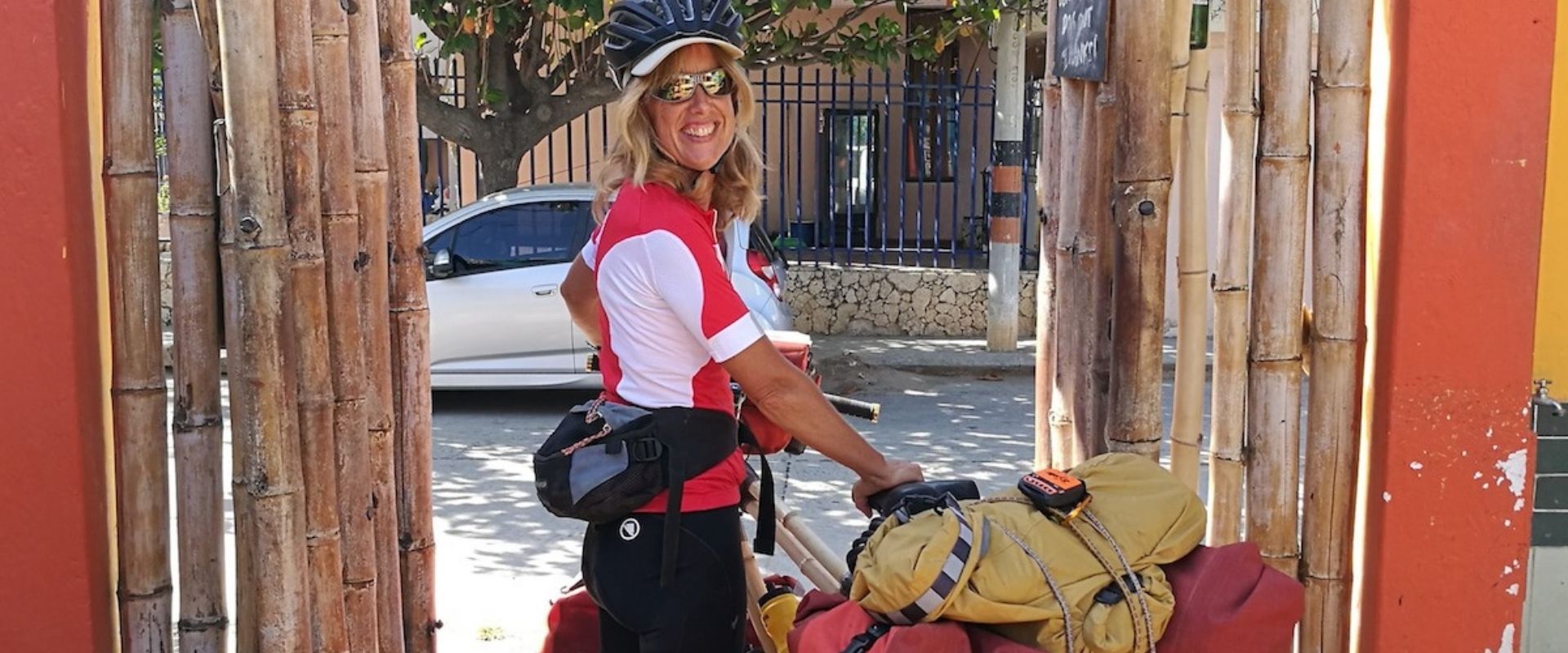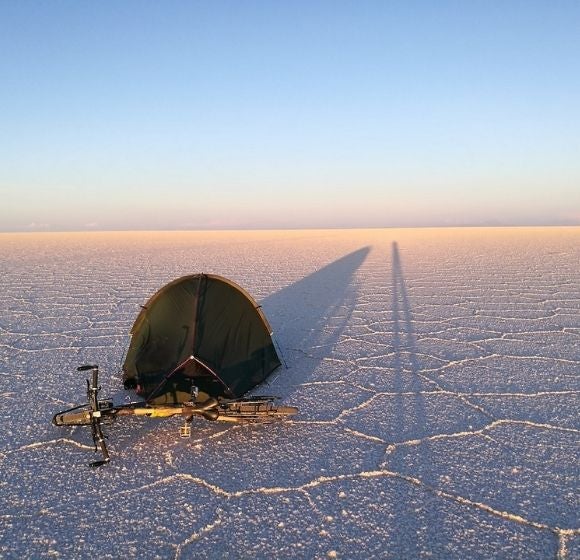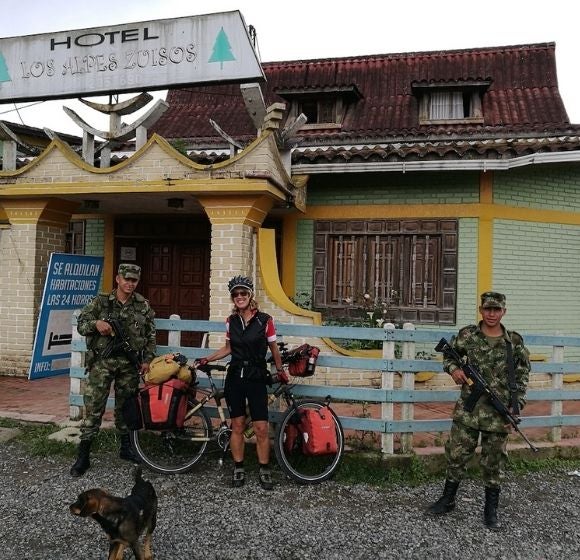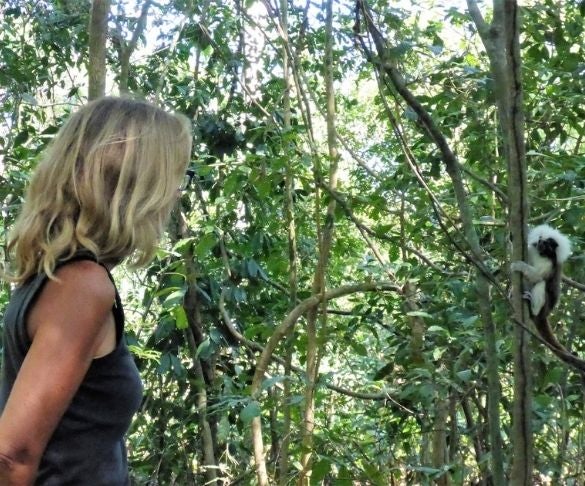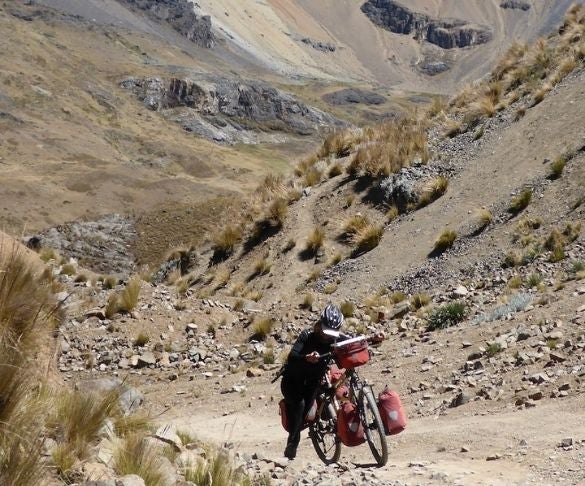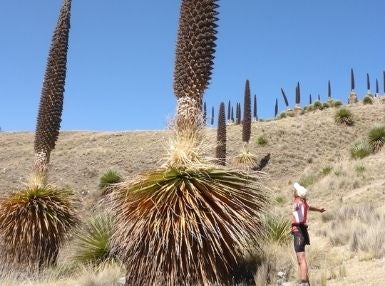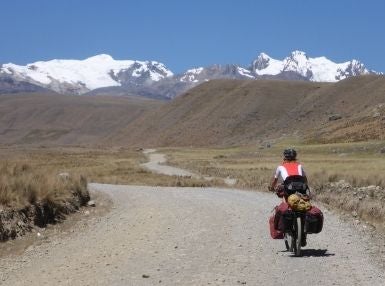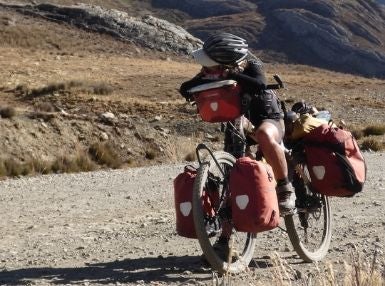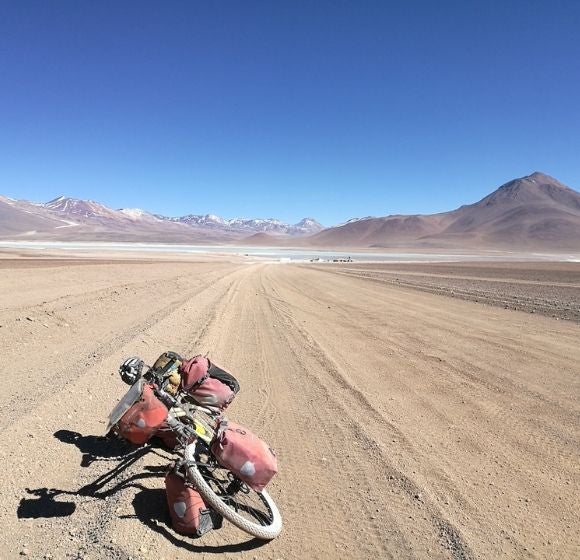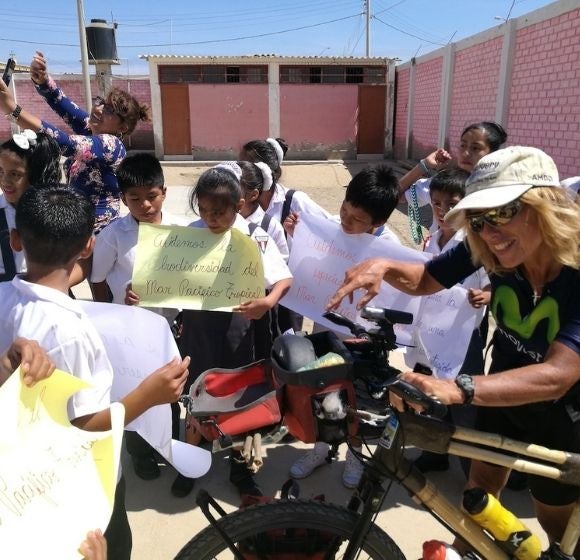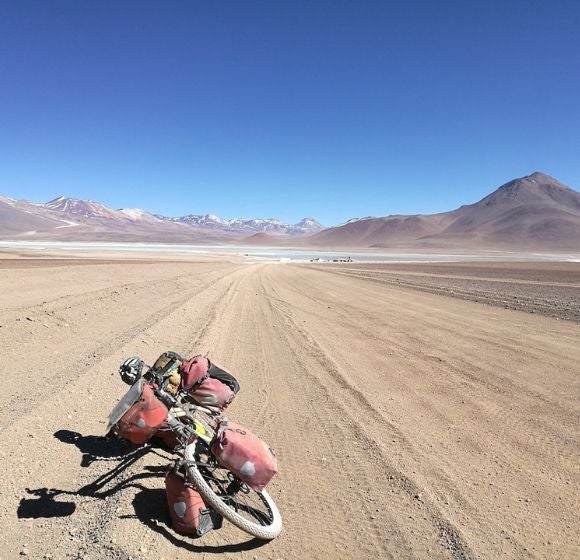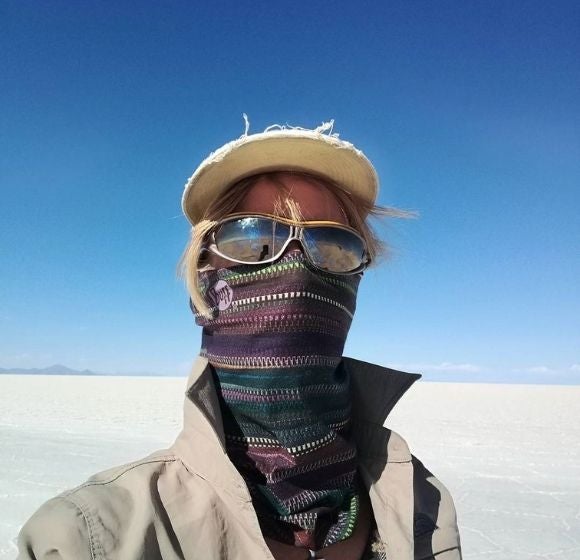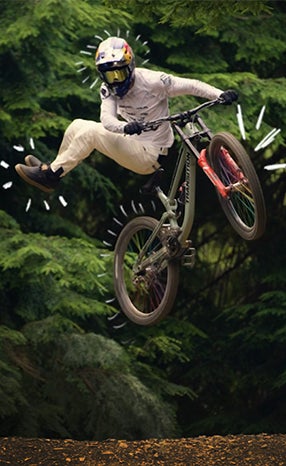NO TYPICAL CYCLIST
This is not a typical article about cycling. For a start, the rider is “definitely not an athlete”. The ‘course’ is an entire continent. ‘Victory’, if it can be described as such, depends upon increasing awareness of humanity’s rampant destruction of the ecosystem it depends upon for its own survival. Kate Rawles is not a typical cyclist, and her latest adventure, ‘The Life Cycle’, is far from a typical bike ride.
As we write, Rawles is engaged in the small matter of cycling 8,000 miles from Colombia to Cape Horn; or, to put it another way, she is following the spine of the Andes, taking in almost the entire length of South America and a host of different sights, sounds, smells, nationalities, cultures, and, most importantly, environments. She is doing so alone, on a bicycle made from bamboo.
“What an amazing thing, to be out on your bike, day in, day out, in incredible landscapes, to learn and hopefully have a chance to make a difference. It’s an incredible privilege.”
“I’m a massive fan of the bicycle, and the link between the bicycle, adventure and low-impact living. That’s key,” she explains, with an enthusiasm that renders the delay on our Skype connection to Chile null and void. “The world is full of people having adventures, and that’s really impacting upon the planet that we’re adventuring in, and I think we really have to think about that.”
She is making her incredible journey in Endura clothing. The Livingston brand has recently committed to become PFC-free for all garments manufactured from 2018 onwards. Rawles’ regular bulletins to Brand Director Pamela Barclay cannot help but have a positive impact. Her enthusiasm is contagious.
“Businesses like Endura are in such an exciting position,” Rawles says. “It’s a great question to be grappling with: how do we create the stuff that we need and want, and not just in a low impact way, but in a way that’s constructive; in a way that helps people and the environment.
“I think that’s just such an exciting question, and as a species we’re well placed to grapple with an issue [environmental protection] that’s about creativity and design and intelligence, so I’m absolutely optimistic that we can solve this, but it does take the will. We have to know what we need to do, and we have to be up for grappling with it, and then we need to crack on and do it.”
THE RIGHT TOOL FOR THE JOB
Rawles is cycling for something more than the pleasure of riding. Much more. A former university lecturer, and an environmental activist of the most inspiring kind - "It’s not about hardship. It’s about feeling alive" - she is riding to raise awareness of the fundamental nature of bio-diversity to human survival, and the terrifying rate at which species and ecosystems are being destroyed.
She is passionate, empowered, and impressively well-informed, but her tone is refreshingly non-judgemental. Her sadness at the worst examples of humanity’s crass disregard even for its own survival is counterbalanced by genuine joy at the strength of those prepared to stand up and fight.
“One of the biggest things I’ve learned is that 98 per cent of people in the world are friendly and helpful. I think if you set out with an attitude of trust, that generates a positive reaction in people.”
“I think that’s been one of most moving and powerful encounters of my life,” she says of her meeting with 24-year-old Jennifer Rodriguez, a mother, who, after years of campaigning with other young people, forced a referendum on a proposed gold mine near her community in Colombia, at huge personal risk, and won.
Rawles is a passionate believer in the power of the bicycle to reconnect the rider with the world around them; to place the man or woman in the saddle inside the landscape they are cycling through. It is this reconnection, more than physical, and with a community that she describes as “wider than human” that she believes offers nothing less “than the key to personal happiness.”
“I think the bicycle is totally the right tool for the job [of adventure]. There’s another dimension: that you’re really in the landscapes you're travelling through. It’s a cliché isn't it - ‘to reconnect with nature’ - but I think it really does happen with a bicycle, in a way that you can’t in a car on a train.
“You’re in the world: you feel the rain, you feel the wind. You’re in the landscapes; you can smell them, you hear them, you can see the wildlife and so on, there’s a real reconnection to the natural world.”
WHERE THE HECK AM I?
Camping on salt flats in Bolivia must feel like camping on the surface of the moon. Is it possible to describe the sensory overload that comes from leaving your tent in the morning to be confronted by the dazzling vista captured in the striking image above? Rawles does not mince her words. “You think, ‘Where the heck am I?’”
“I’d been riding on a pretty remote section of dirt road, and I came over the brow of a hill, and it was just like seeing a white desert, or a white ocean in front of you. It was extraordinary.
“Some people argue that if our ecosystems start to collapse, it’s going to be even harder for people than climate change, and it’s an issue that’s not getting anywhere near enough attention.”
“And then cycling down onto it, you realise that it’s textured: you’re riding over these slightly hexagonal, crystalline shapes. The landscape is completely flat and a brilliant white, and just goes on for hundreds of miles.
“So opening the tent door in the morning makes you think: ‘Where the heck am I?’. It was one of the most impactful landscapes I’ve been in; just the scale and the difference. I’d never seen anything like it. It was amazing.”
Like most deserts, Bolivia’s salt flats are far from hospitable. Rawles describes the environment as “very extreme” and even this seems to be underselling her experience. She spent her days trying to protect herself from the sun: the blazing ball above and the searing heat reflected from below. At night, temperatures plummet, and even a glittering sky cannot compensate for temperatures of “at least minus ten.”
“You go out in the night, and the stars - you can just imagine, these huge, crazy southern hemisphere skies, a chaotic world of stars, which was incredibly beautiful. Then you realise how cold you are in your tent.”
A BRAVE DECISION
Rawles makes light of her incredible journey, but her bravery is extraordinary. Then there is the planning, and her resourcefulness in setting up camp in landscapes whose inhospitably is often beyond imagination.
She laughs off my incredulity and enquiries about the level of planning demanded by adventure on such epic scale (“You think any of this was planned? That’s quite an assumption!’).
“I wore the Movistar Team jersey a lot in Colombia, where it went down extremely well. I got loads of positive comments as I rode past at 10mph. I don’t think Nairo Quintana has ever cycled with panniers!”
A Bolivian salt flat might be the sort of landscape in which you’d expect only to find the likes of Ray Meares, or someone with similar training, but Rawles falls back on ingenuity and long experience. We are talking, after all, to a woman who once cycled more than 4,500 miles, from Texas to Alaska, to explore North American attitudes to climate change.
She has an inspiring faith in humanity (large parts of it, at least). Rawles is friendly, but savvy; prepared to believe the best about the people she encounters, while maintaining a sensible regard for her position as a stranger in a strange land. The geographical distances she has travelled are vast, and the cultural differences are of similar magnitude, but a smile is a smile, in any language or location.
“One of the biggest things I’ve learned on all of my trips is that 98 per cent of people in the world are friendly and helpful. I think if you set out with an attitude of trust, that generates a positive reaction in people. Not naive trust - you have to have your antennae alert to any kind of problem - but in general people are friendly, and helpful, and will look out for you; especially travelling alone as a woman, I think. I’ve drawn hugely on all sorts of experiences there in the past. That helps a lot.”
Too late, I realise the naivety of my next question: what are the people like in South America? One might as well ask what Europeans are like, ignorant of the differences between the British and the Spanish, the Germans and the French.
Rawles has already visited half-a-dozen countries, and points out that nationality amounts to the least significant of the manifest cultural differences. Indigenous communities in Chile, for example (“utterly non-European, obviously”) are a world removed from those of Spanish descent; so much that even her limited Spanish is rendered useless.
MEET WOODY
Happily for Rawles, the limiting effects of her halting Spanish have been mitigated by her companion, “Woody”, a bamboo bike she built with a little help from friends at London’s Bamboo Bicycle Club. Not only has it proved extremely reliable (“I say this with a touch of surprise, as I made it! My friends were definitely a little startled”), it has proven a conversation starter without equal.
Whether meeting heavily armed soldiers in Colombia or children in Peru, Woody has not failed to capture attention, and has instantly won hearts and minds; especially of those who might otherwise have wondered why a lone British woman was in their midst. The bicycle’s secondary power as a licence for conversation with total strangers is not lost upon Rawles.
“I think the bicycle is totally the right tool for the job of adventure. It puts you inside the landscapes you’re travelling through. To ‘reconnect with nature’ is a cliché, but I think it really does happen with a bicycle.”
“I have some lines prepared in Spanish, and one of those is: ‘Yes, the bike is made of bamboo, and I made it myself in England,’” she says, laughing.
“If you turn up in a little town, I think anywhere in the world, on a heavily-loaded bicycle, people will come and talk to you. It’s a door-opener, in terms of making contacts. It’s like having a cute puppy! People feel like they’ve been given permission to come and ask you where you’ve come from, where you’re going: ‘Why aren’t you in a car? And why are you on your own?’ It’s really lovely human contact, and that just doesn’t happen if you turn up in a car.”
FUEL TO RIDE
By moving the conversation to athleticism and diet, I feel I'm returning to more familiar ground, but this is cycling of a different type to that practised by Movistar Team or Cervélo Bigla. For Rawles, her lack of any special athletic gift is cause for celebration: proof that anyone can utilise the bicycle as a tool for adventure.
Her strict vegetarian diet ("very long-term, very committed") has removed meat and fish from her culinary choices in locations where culinary choice might not be abundant. Typically, she accentuates the positive: in all other regards, she is an unfussy eater, and a diet consisting almost entirely of carbs and protein has turned her into a “lean machine".
“Some of the people who are really struggling to stay alive from day to day are also the people who are most impacted by environmental issues.”
“I cannot tell you how many plates of rice and eggs I've eaten; sometimes three plates of rice and eggs a day! I don't know what it does to you long-term to be eating nine eggs a day - it can't be good! So that has been a challenge, but then again, it's great to have rice and eggs, right? That's a good bit of carbs and protein.
“I'm very unfussy about food, except for not eating meat and fish, so that's a great advantage. I've lost a lot of weight, there's no question. In the last couple of months, I've tried to up the mileage for various reasons, and crack on a bit. That was the point at which I really was struggling to get enough to eat, so the weight really was falling off me there for a bit, but that's not necessarily a bad thing, is it?”
Bread and cheese are readily available, and fruit and veg are easily purchased from roadside stalls, even if rarely served in cafés and restaurants. When she is camping, and far from civilisation, she sustains herself with Roman noodles and broccoli. The effect of her diet, combined with thousands of miles, has sparked a profound change.
“Working so hard physically is part of the alchemy. A glass of water tastes amazing. Sitting under a tree and finding shade when it's hot is incredible. I can remember a bowl of lentil soup that you would not believe how much I enjoyed! Just these basic things were so magical and so appreciated, and that to me is the secret of a happy life. I mean, if a bowl of lentil soup can make you ecstatic, you don't need a lot more!”.
THE CARBON CYCLE
The Crane brothers, authors of the now seminal Bicycles Up Kilimanjaro, provided Rawles with her earliest inspiration to ride. Nick and Richard Crane cycled to the summit of Africa’s highest peak to raise funds for the charity Intermediate Technology, focussed on providing clean water in parts of Africa.
Rawles manages to express admiration with the phrase “absolute nutters”. Needing no further encouragement, she cycled, as a new graduate, from the source of the Rhône to the Furka Pass in Switzerland, to raise awareness and money for the charity War on Want.
“Working so hard physically is part of the alchemy. A glass of water tastes amazing. Sitting under a tree and finding shade when it’s hot is incredible.”
A seed had been planted; one that flourished during her years as a lecturer. Recognising the power of adventure to raise awareness, she came up with the concept of ‘adventure plus’. The rest, as they say, is history.
Rawles has form as a traveller, and, latterly, cycling thousands of miles to raise awareness about environmental issues. She began by winning selection for a place on a yacht sailing from the UK to Azores and Canaries to research plastic pollution.
She was just getting started. In 2006, she set out on the aforementioned Carbon Cycle, during the presidency of an oil baron. Rawles is not one to shy away from a challenge.
“It was at the height of the Bush administration, so exploring climate change at that point was really, really fascinating,” she says, with ironic understatement. “You can imagine some of the crazy comments I encountered!”.
It’s a measure of Rawles’ optimism that she believes the issue of climate change is at least established in the leading economies, even if responding to it with the sort of sweeping change required to meet the scale of the challenge still seems some way off. It’s a measure of her relentless drive that she is now determined to ensure that the issue of biodiversity loss and the destruction of ecosystems attains equal prominence.
“It’s every bit as important and impactful as climate change,” she says. “Some people argue that if our ecosystems start to collapse, it’s going to be even harder for people than climate change, and it’s an issue that’s not getting anywhere near enough attention.
“That’s why I decided to focus this ride on biodiversity loss: what that is, why it’s happening, why it matters, and, above all, what we can do about it. So I’ve been visiting all sorts of different biodiversity-related projects on the journey.”
FOREST FIGHTERS
Do not assume for a moment that Rawles’ visits to environmental projects constitutes a holiday of sorts. The sheer scale of the ride would destroy that idea at a stroke, but there a further dimension lies in her determination to tell the stories of those brave enough to fight those prepared to destroy the environment to further their own ends.
She talks of the Shuar people of Ecuador; an indigenous community who live in the rainforest and who are witnessing their homes cut down around them. Rawles makes a critical point: they have no choice but to stand up and fight the mining companies who are destroying their way of life.
“As a species, we’re well placed to grapple with an environmental issue that’s about creativity and design and intelligence, so I’m absolutely optimistic that we can solve this, but it does take the will.”
For some living in the pampered West (this writer included), rainforest destruction is a topic of remote concern. For the Shuar, it is as fundamental as the council building a road through your kitchen.
“Some of the people who are really struggling to stay alive from day to day are also the people who are most impacted by environmental issues,” Rawles explains.
“Quite often, the drivers turn out to be multinational companies. It’s not usually the little guys, it’s big companies that are driving massive deforestation, that are behind the fossil fuel exploration in the rainforest. And this is something that I’ve learned that has been really shocking.”
It’s highly unlikely that a traveller and an activist of Rawles’ experience had bargained on a visit to some South American ‘Eden Project’, but she is happy to admit that she has been left humbled by the scale of the issue, and the bravery of those prepared to fight organisations that enjoy government support, and who, in extreme cases, employ their own private armies.
THE LONG WAY HOME
Nothing about Rawles’ South American adventure has been easy. She will return to the UK in mid-February by cargo ship, having travelled out the same way. Aeroplanes do not fit her agenda.
Having left behind a career in academia, Rawles has embraced adventure with a fervour that others might struggle to match, but is humbled by those, like Jennifer Rodriguez, who have fought to protect their environments.
“Cycling and concern for the environment go hand-in-hand. Kate embodies these twin passions better than anyone we know.” Pamela Barclay, Endura
Rawles rejects the term ‘brave’ to describe her own efforts, but here we must agree to differ. She does, however, concede a mental approach apt for riding enormous distances, and has learned that the feeling of imminent death in fact signals sufficient energy to ride another 25 miles. She has shed tears and uttered expletives in her darkest moments on the bike, but her default setting is upbeat.
“Absolutely a positive approach,” she agrees, with real enthusiasm. “I’m not here suffering, believe me! There is the odd day, but in general, what an amazing thing, to be out on your bike, day in, day out, in incredible landscapes, learning all this stuff, and hopefully having a chance to make a difference. It’s amazing - an amazing privilege!”.
Endura’s small part in Rawles’ big adventure is regarded with pride in Livingston. To support an elite athlete, or team of athletes is more typical, but Rawles rides for a greater purpose than winning races. She is concerned with riding far, not fast, and regards stopping as an opportunity to increase her knowledge, rather than failure.
“We’re in the fortunate position of meeting inspirational riders on a fairly regular basis, from Grand Tour winners to world champion para-athletes, but Kate’s adventures are truly exceptional,” Barclay says.
“By committing to become PFC-free for all Endura garments manufactured from 2018 onwards, we’ve changed our own processes, but we’re keenly aware that there’s more to do. Cycling and concern for the environment go hand-in-hand, and Kate embodies these twin passions better than anyone we know. To supply her with clothing has been a privilege, but her message and achievements have been a powerful force for good in terms of how we operate as a brand.”
Rawles’ choice of attire for the Colombian leg of her adventure encapsulates Endura’s approach. By wearing the Movistar Team jersey synonymous with national hero Nairo Quintana, she gained the goodwill of everyone she passed, without trying.
“I really like the Movistar Team jersey, and I wore it a lot in Colombia,” she says, laughing. “It went down extremely well. I was hoping to meet Nairo, but of course that never happened; it was a bit of a fantasy. I got loads of positive comments as I rode past at 10mph, with panniers! I don't think Nairo Quintana has ever cycled with panniers!”.
To follow Kate's progress in real time, visit www.outdoorphilosophy.co.uk
Footnotes Words by Timothy John. Images used with permission of Kate Rawles
© 2021 ENDURA
